View this article in another language
- 한국어
- English
- 日本語
- 中文
- العربية
- Español
- Français
- Deutsch
- Pусский
- Tiếng Việt
- Indonesian
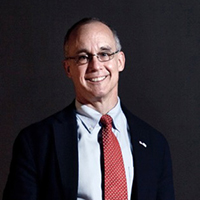
By Ned Forney
As the elderly American, surrounded by cameras, microphones and reporters walked toward the memorial, two Korean men stepped forward from the crowd. As if on cue, the sea of people suddenly parted and the three men shook hands, their warm smiles and contagious laughs drawing everyone’s attention. It was a magical moment, one that words and pictures can’t capture. It was the feeling that made it so memorable.
The two Korean men, known as “Kimchi 1” and “Kimchi 5,” and the American, Burley Smith, first met nearly 68 years ago during the Korean War (1950-1953). Burley was a jr. third mate aboard the SS Meredith Victory, and the Koreans were two of the five babies born on the ship during its two-day voyage from Hungnam, in what is today North Korea, to Geojedo Island, near Busan in Korea, in December 1950. The two Koreans, Lee Gyeong-Pil and Sohn Yang-Young, were given their “kimchi” nicknames by the Meredith Victory’s crew and had come to the ceremony to personally thank Smith for saving their parents’ lives and for saving their lives. They were genuinely grateful, and we all felt it.
The guys On the ship
All too often when researching the Korean War, I come across little-known anecdotes of selfless, hard-working men who served aboard U.S. Merchant Marine ships during Korea's three-year conflict. These men, although they played a key role in the war, often go unrecognized. They’re simply “the guys on the ship.”
For U.N. forces fighting on the ground, however, they were much more. The dedicated men of the Merchant Marine, many of whom had earned their sea legs during World War II, transported everything from food and ammunition to vehicles and weapons to a war front, over 10,000 km/ 6,500 miles away from home. For many U.S. GIs and their commanders, the Merchant Marine ships were a literal life saver.
As prominent military tacticians and historians have long argued, the difference between battlefield victory and defeat often revolves around logistics and the ability to keep troops well-fed, supplied and equipped. The Korean War, like World War II before it, reinforced this argument and illustrated the importance of a highly trained and professional Merchant Marine.
Despite the importance of these ships, however, their crews have been largely forgotten, relegated to a mere footnote in history. However, things are changing. Men like Jr. Third Mate Smith of the U.S. Merchant Marine are now being recognized.
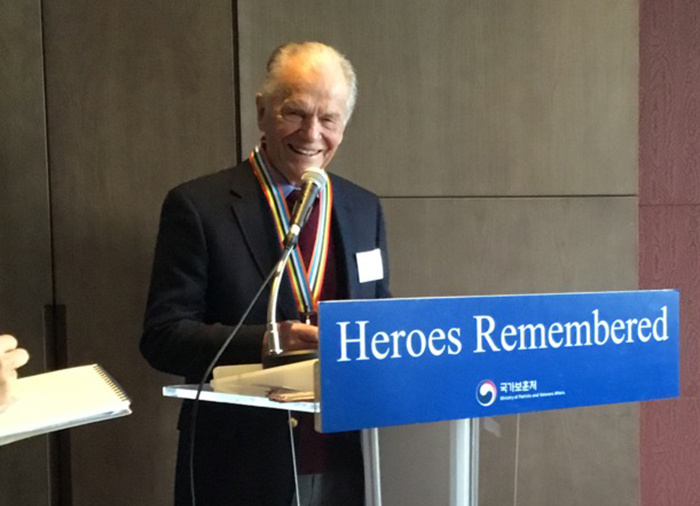
Smith gives his acceptance speech after receiving an award from the MPVA. (Ned Forney)
Reporting for duty
I was introduced to Burley Smith three years ago, and he’s one of the most interesting, optimistic, and unassuming men I’ve ever met. Born in 1928, he spent his childhood and high school years in Atlantic City, NJ. Just a month before the outbreak of the Korean War, he graduated from the US Merchant Marine Academy in Kings Point, NY. By July 1950, he was on his way to Korea.
The newly-commissioned deck officer had been assigned to the SS Meredith Victory, a World War II victory ship skippered by Captain Leonard LaRue, a veteran of the deadly Murmansk runs that supplied the USSR with invaluable equipment, fuel and weapons. LaRue, Smith, and the Meredith Victory's entire 50-man crew would soon be making history.
In less than three months, they would play a key role in the Hungnam Evacuation, the unprecedented military and humanitarian operation in December 1950. However, they would first have make it through the Inchon Landing.
Our hearts were in our throats
On the afternoon of Sept. 14, 1950, one day before MacArthur’s historic and hugely successful Inchon Landing, a typhoon hit the invasion fleet. Burley vividly remembers the storm's terrifying “hurricane force winds and waves of 15 to 18 meters/ 50 to 60 feet."
At one point during the massive typhoon, Burley feared that the Meredith Victory, filled with supplies, tanks and soldiers, might not make it. A giant wave slammed into the ship, causing Sherman tanks and military trucks lashed to the upper and lower decks to break free. With the ship now unstable and listing severely to the starboard, it looked like the worst was about to happen. “For a few breathless moments,” he remembers, “we were not sure if the ship would be able to survive the tremendous roll.”
LaRue turned the ship around, a dangerous and necessary move, and saved the Meredith Victory from capsizing. “None of us had ever experienced anything so extreme,” Burley told me. “Truly, our hearts were in our throats.” Unfortunately, there was more to come.
A few days later, the Meredith Victory found herself in another precarious situation. Anchored in Inchon Harbor with numerous other vessels, the ship suddenly became the target of two North Korean planes.
On deck that morning enjoying the blue skies and calm weather, Burley saw the Soviet-era World War II fighters heading straight for him. A direct hit from one of the plane’s bombs would have resulted in certain casualties, but at the last minute the planes veered and attacked another ship. The pilots, thankfully, missed their targets and no vessels were sunk. The Meredith Victory had again avoided disaster.
A Christmas miracle
By late December 1950, after numerous trips up and down the Korean coast, the Meredith Victory was on its way to Hungnam. Civilians fleeing from the Chinese army and hoping to be rescued were trapped in the port. U.S. and Korean troops were also there. Chinese troops had forced them out of the Jangjin Lake (장진호)/ Chosin Reservoir area and they were now evacuating to Busan.
When the Meredith Victory sailed into Hungnam Harbor on Dec. 22, its crew saw tens of thousands of refugees waiting along the port’s docks and beaches. Describing the scene, Burley said, “The people on the dock, to me, that’s what we were there for, that was our job. The problem was how we were going to get them aboard.” There were too many people and not enough time to get them all loaded. “It looked like Times Square on New Year’s Eve,” Burley remembered.
With U.S. battleships and fighter planes pounding the mountains around Hungnam, the crewmen of the Meredith Victory loaded refugees for nearly 24 hours. The ship then maneuvered through “a very narrow channel cleared of mines, it couldn’t have been more than a hundred yards wide,” and sailed out of the port on the afternoon of Dec. 23. With no way to protect themselves or their passengers from enemy planes or submarines rumored to be in the area, the crew spent the next two days sailing down the coast of Korea to Geojedo Island near Busan with 14,000 refugees onboard. It was the largest humanitarian rescue operation, ever, by a single ship.
When the Meredith Victory was finally unloaded on Christmas Day, every refugee was alive, including five babies born during the voyage. “We were just young men doing our job,” Burley later said.
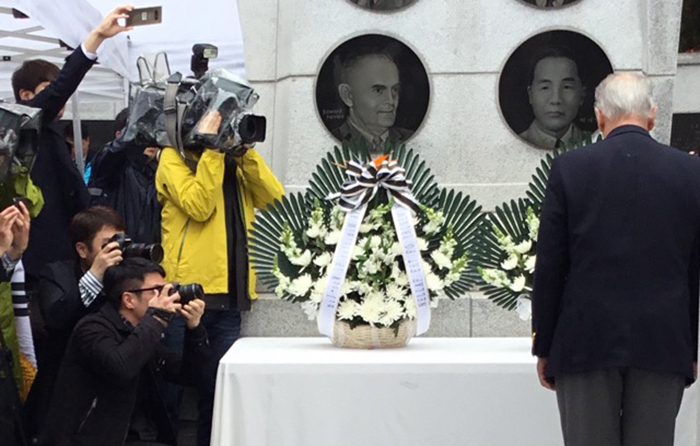
Burley pays tribute at the Hungnam Evacuation Memorial on Geojedo Island near Busan. (Ned Forney)
A grateful nation pays tribute
This past Friday, Burley Smith, now 89-years-old, was recognized by the Korean government for his service in the U.S. Merchant Marine and his role in the Hungnam Evacuation. The Ministry of Patriots and Veterans Affairs (MPVA) presented him with an award and hosted a luncheon in his honor.
During the day’s events, I heard government officials, journalists, veterans and everyday citizens express their thanks for Burley’s contribution to Korea. I was also reminded of a little-known chapter in the Hungnam story.
Two of the Meredith Victory’s passengers, a couple with a young daughter, gave birth to a baby boy two years after arriving on Geojedo Island. Their son, Moon Jae-in, one of an estimated one million descendants of those rescued at Hungnam, is now the president of Korea.
The gratitude of the Korean president and an entire nation could be felt throughout the day, and the events were a tribute not only to Burley, but to all the people in the U.S. Merchant Marine who played a role in securing Korea’s freedom.
Organizations like the American Merchant Marine Veterans (AMMV), and people like William Geroux, author of the best-selling book "The Matthews Men," are working hard to recognize these men. More tributes, memorials, awards and well-deserved benefits are being given to the U.S. Merchant Marine. It’s about time.
As President Franklin Roosevelt said about the courageous crews of U.S. ships during World War II, “They have delivered the goods when and where needed, and across every ocean.” The Korean War was no different.
Today I salute Burley Smith and all people -- past, present and future -- of the U.S. Merchant Marine.
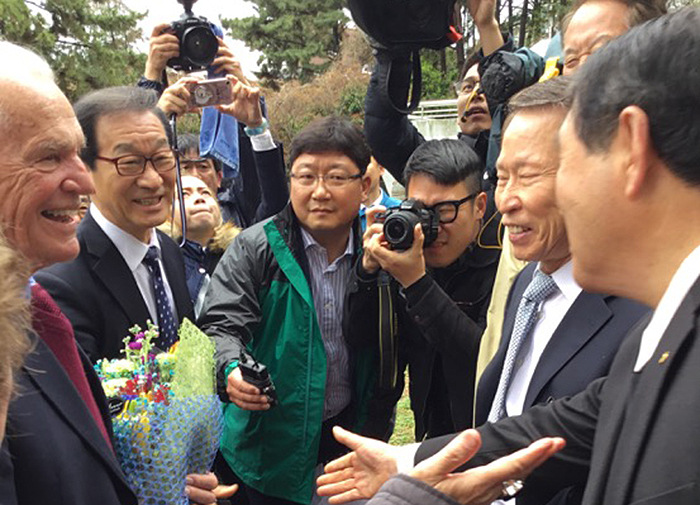
Burley Smith (left) is greeted during a ceremony by the babies who were known to U.S. service members as 'Kimchi 1' (far right) and 'Kimchi 5' (second from right). (Ned Forney)
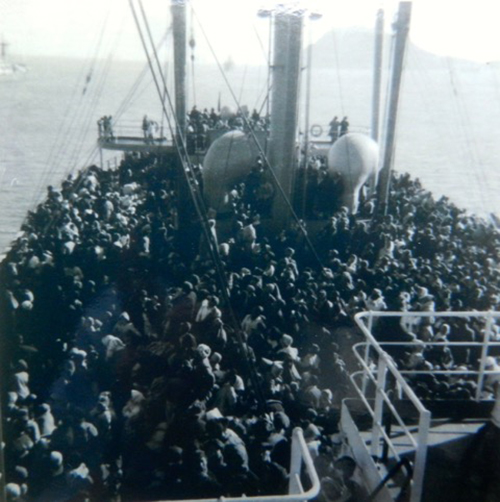
Refugees are on board the Meredith Victory. (Bob Lunney)
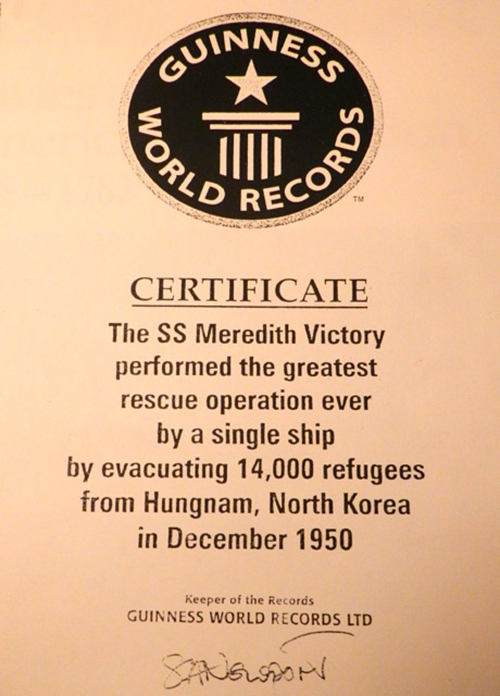
The Meredith Victory receives a certificate from the Guiness Book of World Records. (Guiness World Records)
Ned Forney, a US Marine veteran and career educator, lives in Seoul, South Korea, where he is writing a book on the Chosin Reservoir Campaign and Hungnam Evacuation. He can be reached at ned@nedforney.com and his website is nedforney.com.